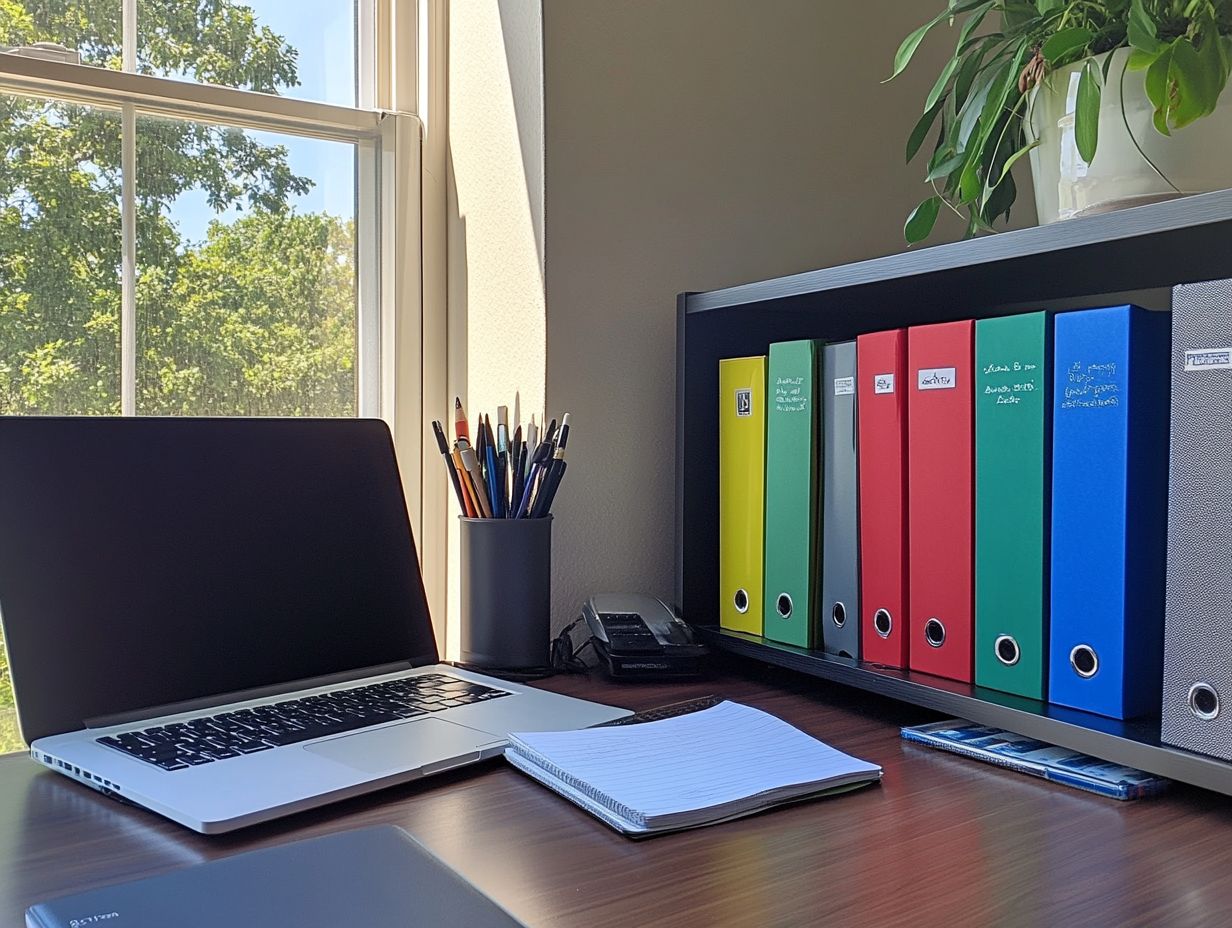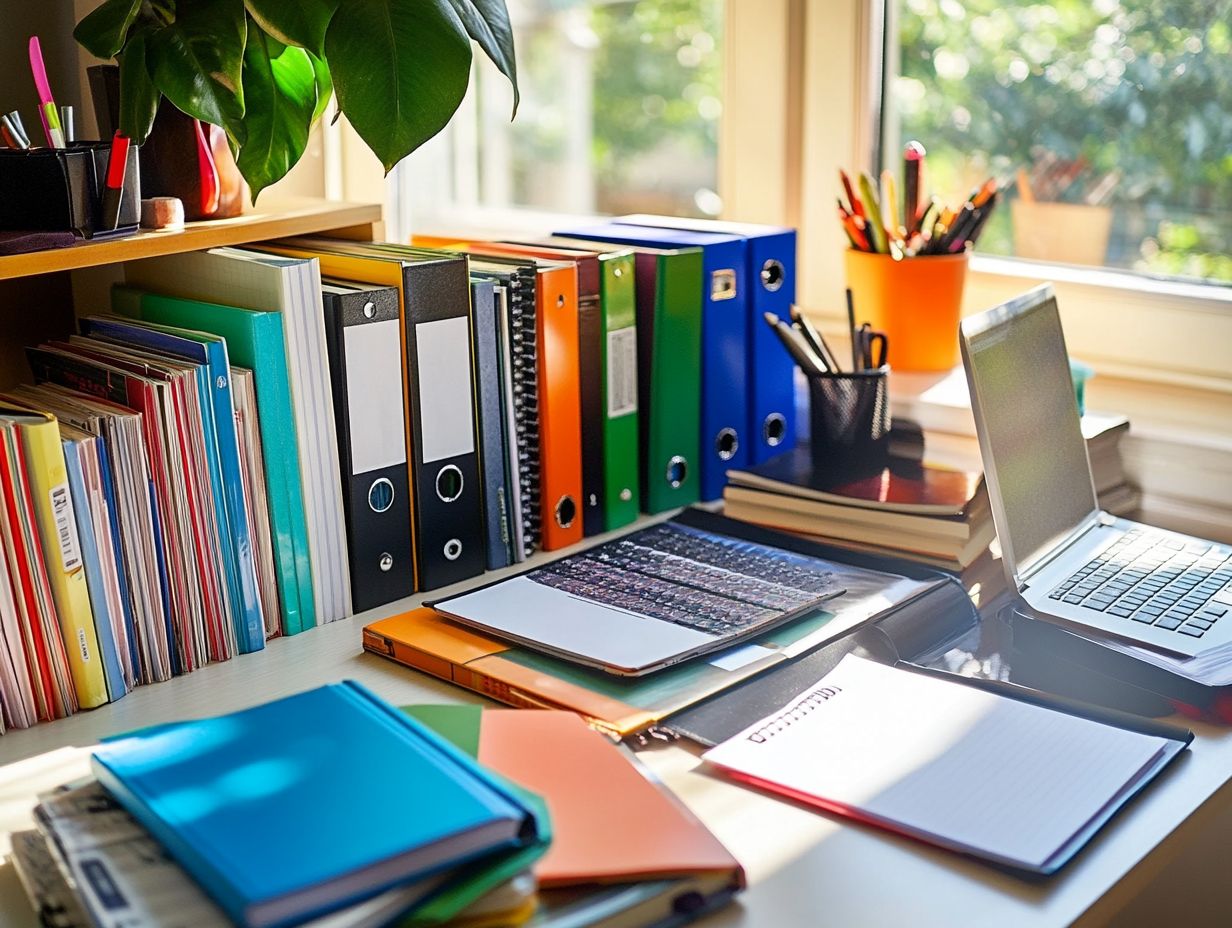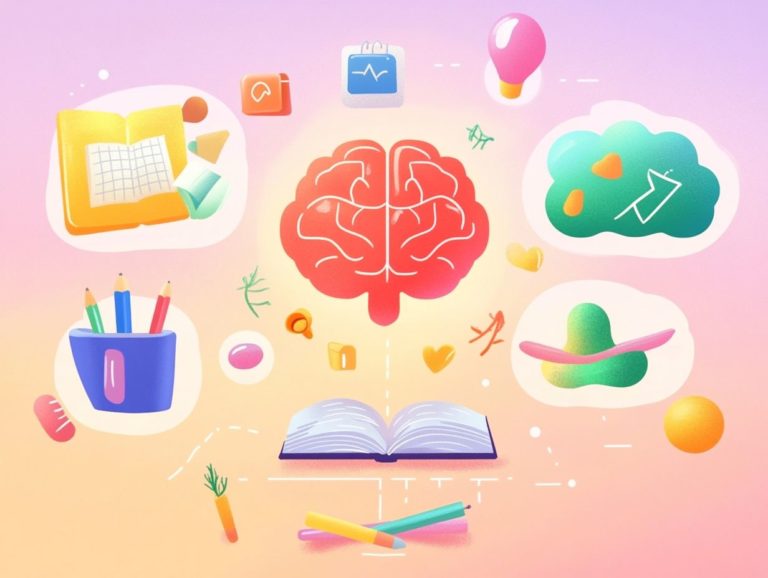tips for organizing your study materials effectively
Organizing your study materials isn’t just a chore it’s a game-changer for your academic success.
An orderly study space fosters enhanced focus and boosts retention. It elevates your entire learning experience. This article delves into the myriad benefits of maintaining a structured study environment. You’ll find effective methods for organizing your materials and essential tools to support your endeavors.
Get ready to discover quick tips that will help you keep your space tidy and your mind focused. We ll also address common pitfalls to avoid. A touch of organization can yield remarkable improvements in your study habits!
Contents
Key Takeaways:

Keep your study materials organized to improve focus and retention.
Create a personalized system for organizing your study materials.
Use recommended tools and supplies to maintain an efficient and consistent study space.
Why Organizing Study Materials is Important
Organizing your study materials is essential. This is true whether you’re in middle school, high school, or college. It plays a key role in enhancing study effectiveness. It also boosts academic success and hones time management skills.
By embracing an organized approach, you can streamline your study schedule. You will effortlessly access and utilize vital materials such as notes, textbooks, and flashcards.
When you adopt effective study skills and strategies, you turn study habits into a systematic routine. This fosters meaningful learning experiences and improves retention when exam time comes around.
The Benefits of an Organized Study Space
An organized study space offers a wealth of benefits. You will experience heightened focus, minimized distractions, and enhanced retention of your study materials.
When you cultivate an orderly environment, your concentration levels soar. A clutter-free desk can dramatically improve your time management skills, making it easier to prioritize tasks.
Consider using strategies such as:
- Using noise-canceling headphones
- Setting specific study hours
- Utilizing apps to block distracting websites
Incorporating features like a designated study area, optimal lighting, and comfortable seating can transform an ordinary space into a productivity powerhouse. By making these thoughtful adjustments, you can foster an atmosphere that supports effective learning and instills a sense of accomplishment.
Methods for Organizing Study Materials

Several effective methods exist for organizing your study materials. These can significantly enhance your study habits and boost your overall academic performance.
Consider exploring digital organization techniques alongside active studying strategies to optimize your learning experience.
Creating a System that Works for You
Creating a personalized system for organizing your study materials is crucial. This ensures that study skills align with your unique learning preferences.
Recognizing that each student has distinct strengths and challenges allows you to tailor techniques that enhance motivation and academic performance.
For example, you might find it helpful to:
- Break your study materials into manageable chunks
- Use color coding for different subjects
- Craft a dedicated study schedule that syncs with your peak productivity hours
Engaging with an academic coach can offer invaluable strategies, such as techniques like reviewing material regularly or spreading out studying over time.
However, don t underestimate the power of personal discovery. Experimenting with various methods can lead you to effective techniques that work best for you.
This blend of expert guidance and personal experimentation enables you to develop robust systems. These not only improve your comprehension but also foster a profound sense of ownership over your learning journey.
Tools and Supplies for Organizing Study Materials
To effectively organize your study materials, you can leverage a variety of tools and supplies. These will elevate your learning experience.
Consider incorporating digital organization tools, flashcards, and concept maps into your study routine. Each resource can enhance understanding and retention, making your study sessions more efficient and enjoyable.
Recommended Tools and How to Use Them

There are several highly recommended tools for organizing your study materials that can boost your academic success through effective studying.
By leveraging these platforms, you can streamline your study processes and ensure that your notes, resources, and schedules are not just accessible, but effortlessly manageable.
For instance, applications like Evernote allow you to categorize your notes into notebooks, making retrieval incredibly efficient. Similarly, tools such as Trello can help you visualize tasks and deadlines, aiding you in planning your study schedules with precision.
Using digital flashcards with platforms like Anki can boost your memory retention through spaced repetition, a method that helps you remember information over longer periods. Each of these tools offers unique benefits tailored to different learning styles, ultimately fostering a more organized and productive academic experience.
Tips for Maintaining an Organized Study Space
To maintain an organized study space, you must invest consistent effort and cultivate effective study habits.
This commitment supports a productive study schedule and enhances your overall learning experience.
Strategies for Consistency and Efficiency
Implementing specific strategies can significantly enhance your consistency and efficiency in maintaining an organized study space.
To achieve this, consider establishing a regular review session schedule. This approach helps create a routine that fosters familiarity and improves retention of material.
Minimizing background noise can also enhance your focus. Think about investing in noise-cancelling headphones or finding a quiet nook where distractions are kept at bay.
Regularly assessing and refining your study techniques is invaluable.
For instance, incorporating active learning methods or using spaced repetition can substantially boost your retention rates. Set reminders on digital calendars to stay on track with these strategies.
Using productivity apps can keep you motivated and accountable, ultimately crafting a more conducive environment for your learning journey.
How Organization Can Improve Your Studying

Effective organization is crucial for enhancing your study habits, significantly influencing your academic success and the application of diverse learning strategies.
By adopting a structured approach, you can optimize your time and resources, ultimately leading to more effective and rewarding study sessions.
Impact on Focus and Retention
An organized study space has a profound impact on your focus and retention, paving the way for higher levels of academic success.
Research indicates that when you maintain a tidy and structured environment, you can effectively minimize distractions and direct your thinking ability where it matters most.
Experts in educational psychology underscore that a clutter-free area fosters clarity of thought, essential for comprehension and memorization.
Try these exciting techniques to boost your study effectiveness:
- Color-code your notes
- Use planners
- Create designated zones for different subjects
These strategies not only streamline your study process but also promote efficient resource management. Over time, adopting these organizational habits can cultivate discipline, ultimately enhancing your overall academic performance.
Common Mistakes to Avoid When Organizing Study Materials
Avoiding common mistakes while organizing your study materials is crucial for cultivating effective study habits that enhance your academic success and overall efficiency.
Invest time in structuring your resources wisely to transform your study sessions into powerful tools for learning and achievement.
Start organizing your study materials today for a brighter academic future!
Pitfalls and How to Overcome Them
Organizing your study materials can be challenging. Common pitfalls can really hurt your consistency and study techniques.
Background noise can distract you. This fragmentation can lower your information retention.
You can overcome these challenges by creating a dedicated study space. Make sure it’s equipped with all the essentials and free from distractions.
Use tools like binders or apps to help you organize your study process more easily.
By focusing your environment and techniques, you can boost your retention and mastery of subjects.
Frequently Asked Questions
How can I effectively organize my study materials?
Start by decluttering. Keep only the essentials and categorize them based on subject.
Use color-coding or labels for easy identification. Store everything in one place to avoid losing materials.
Is it better to use physical or digital study materials?
This depends on personal preference. Physical materials can be more beneficial for visual learners.
Digital materials offer convenience and easy organization.
What is the best way to keep track of deadlines?
Create a calendar for your academic tasks. Note important dates like exams and assignments.
Set reminders a few days before deadlines to stay on track.
How can I effectively manage my study time?
Prioritize tasks and create a study schedule. Include specific time blocks for each subject.
Take breaks to avoid burnout and revise your schedule regularly.
What are some tips for maintaining an organized study space?
Keep your study area clean. Use storage containers to organize materials.
Ensure you have good lighting and a comfortable chair to minimize distractions.
What should I do with study materials after I am done using them?
Develop a system for storing materials. Keep current course materials easily accessible.
Consider donating or recycling materials you no longer need to declutter.






